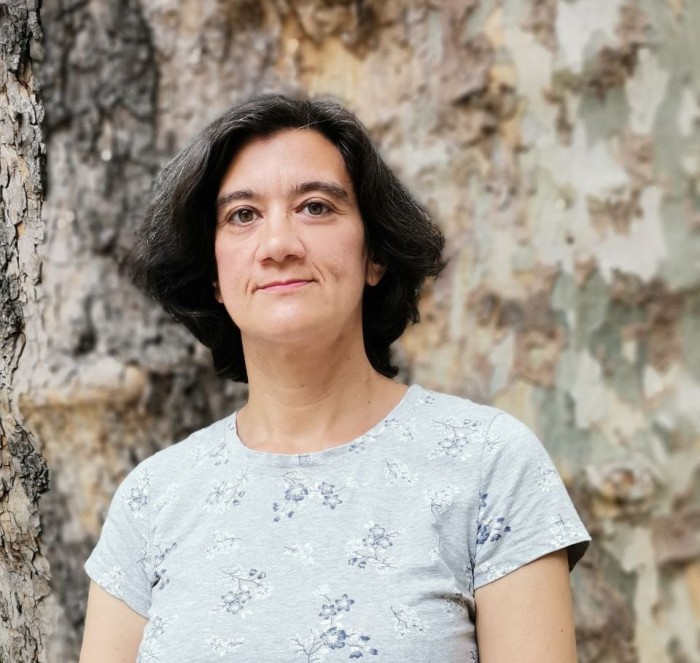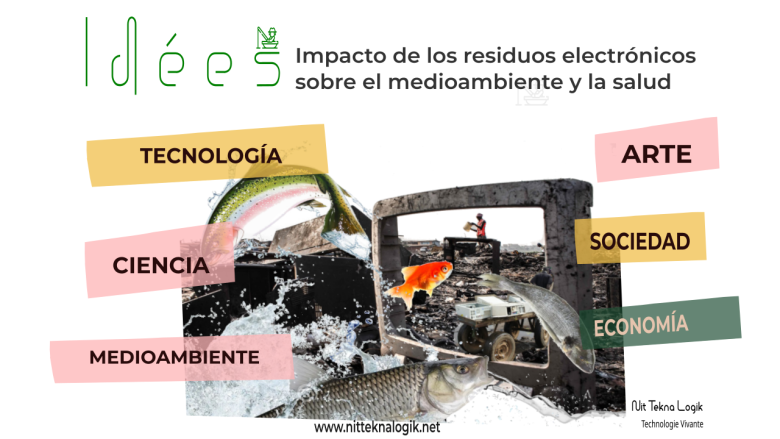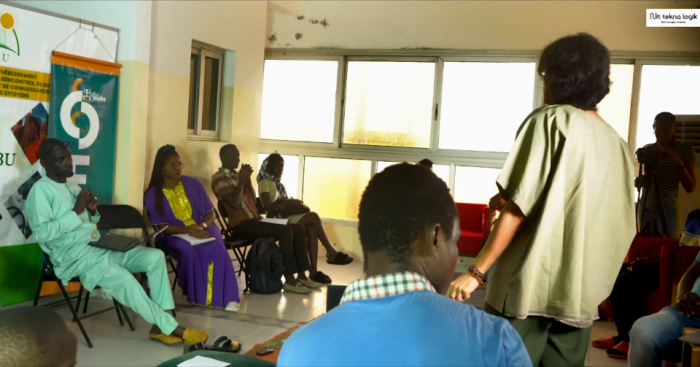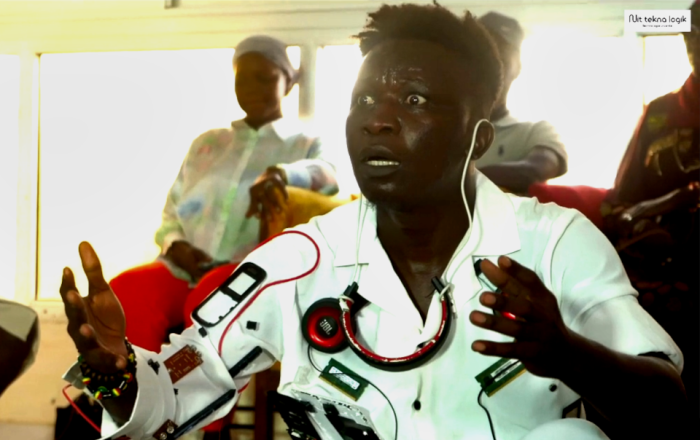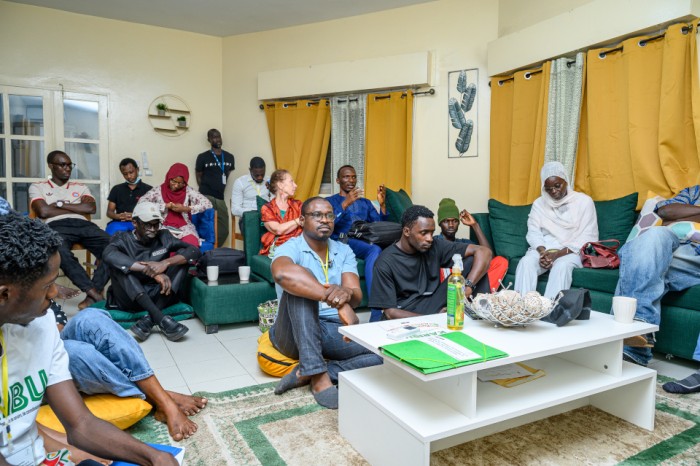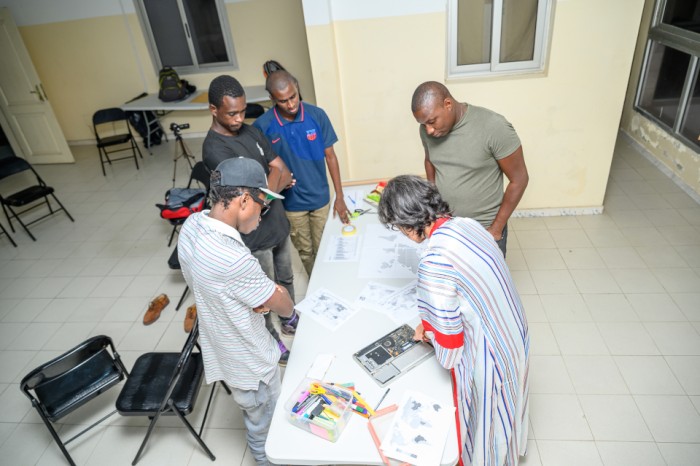IDEES is a transdisciplinary project that brings together technology, art and science to raise awareness of the impact of e-waste on the environment and health.
**CONTEXT
The project started in Senegal, a country that has become a recipient of e-waste despite the fact that the Basel Convention prohibits it. E-waste has become a problem with serious consequences for the environment and health**, due to its exponential growth because of the increase in the consumption of electronic devices. Senegal is just one more country in the global south that suffers from this problem, as these are countries where most of the waste arrives, where there is a lack of infrastructure for its treatment, with its management falling mainly to workers in the informal sector.
TRAJECTORY.
In 2024, a cycle of IDEES project activities was held in Dakar, with the participation of the various partners of the network, as well as the public company Sénégal Numérique. Following the activities, we carried out an evaluation in which we came to the conclusion that it is necessary to raise awareness beyond the local level, as it is a cross-cutting issue, with global implications and unknown to most of the public locally, regionally and globally.
For this reason, we decided to create an online platform, which allows us to contribute to weaving an international awareness network around the impact of e-waste, to establish the relationships between the processes of production and consumption of technology, and how this links us on a global scale, and how we can think collectively about how to stop the environmental pollution, the violation of human rights and the health risks associated with the technological production chain, from extractivism to the creation of waste. Through the strengthening of the international network we also aspire to be able to find solutions within the circular, social and solidarity economy..
The content of the platform will be based on scientific reports on the impact of e-waste, reflections of experts, activists and testimonies shared by affected populations.
The project is based on a critical analysis of techno-colonialism and social responsibility in the production and management of e-waste, as well as a reflection on its causes, who produces it, how it arrives, and how relations between the global north and south are defined in the creation of technology.
Main features and goals of the crowdfunding campaign
The project aims to raise awareness from a transdisciplinary perspective on the need to link climate justice and the defence of human rights to the production/consumption/electronic technology chain, by creating an online platform for awareness-raising and training on the impact of e-waste on the environment and health.
The specific objective of the campaign is to develop a multilingual online platform with a series of videos and webinars.
The platform will feature a series of videos addressing the different issues associated with e-waste, as well as regular live webinars.
The first stage of the platform will create materials and webinars associated with:
Tecno-colonialism: the impact of technological production on the environment and health.
Food karma: Impact of e-waste on the food chain.
Circular, social and solidarity economy: the sustainable economic opportunities of e-waste.
Future imaginaries: creating other imaginaries where collective well-being is paramount.
We hope to add the following content in the future:
Women and children: the invisible victims of e-waste.
The decomposers: The role of the informal sector in e-waste management and its effects.
Microplastics: The fight against plastic in e-waste.
Social responsibility on techno-colonialism*: Citizen, environmental and climate justice engagement.
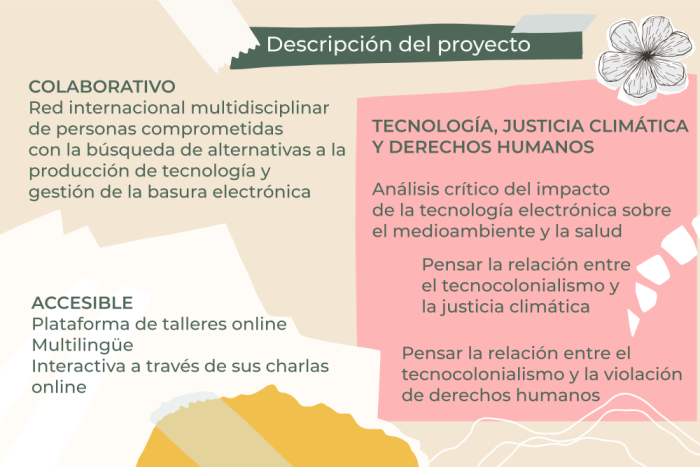
Why this is important
The main motivation is to open a space for collective international reflection on the development, production and consumption of electronic technology. ** The aim of this space is to think collectively about what technology is, what effects it has, who develops it, who consumes it, who produces it, how it is produced and where it ends up, as well as the creation of future imaginaries where the role of technology implies social wellbeing and in harmony with nature.
The project is aimed at all users of electronic technology, computer hackers, creators of electronic music or e-wearable fashion, audiovisual producers, influencers, ecologists, degrowthers, human rights defenders, and anyone sensitive to the social and environmental impact of the production/consumption of technology.
Team and experience
Carolina García Cataño is a technologist, she works for the creation of online and physical spaces where to think about technology, its use and its effects on today's society, using participatory and artistic methodologies.
She has been a hacktivist since the late 90s, as she is part of the Spanish free software movement. She was part of the founders of hacklab wh2001 (Madrid), as well as an organiser and participant in hackmeetings.
She founded a free software cooperative Dabne in 2005, and in 2012 she moved to Germany where she worked as a web developer. Since 2020 she lives in Senegal, where she created Nit Tekna Logik from where she carries out pedagogical projects for the empowerment of women and artists through the use of free technology, from a cooperative, collaborative and sharing perspective. Facilitating universal access to knowledge is one of the driving forces behind her work.
As a technologist, she writes articles and contributions and works on projects that redefine future imaginaries, questioning the techno-solutionist approach, making techno-colonialism visible and seeking a balance between the potential of technology and its relationship with nature.
She is interested in introducing visual and performative arts in the processes of reflection and debate around technology, promoting a holistic approach to social projects so that an alliance is created between art, science and technology.
IDEES, is a networked project, where we work with organisations such as Zèro Déchéts Sénégal, Appcyclers Ghana, BanLieutech Senegal working at the intersection of technology and environment, as well as with a network of collaborators such as the artists Anäel Nkeoua dit Prince Art or Professor Eva García Vázquez.
